Survey Shows Young People Hide Their LGBTIQ Identity in High School
ZAGREB, 6 April 2022 - LGBTIQ high school students in Croatia hide their identity and more frequently experience violence when at college, and lack system support, shows the first national survey on the experience of young LGBTIQ persons in education and the importance of support.
The survey was conducted by psychologist Marina Štambuk in cooperation with the Rainbow Families association and the Rijeka-based lesbian organisation "Lori", and it covered 373 respondents aged 15-30.
The research shows that young people on average become fully aware of their LGBTIQ identity at the age of 14, that they reveal their sexual identity more frequently to their mother than their father, and that in contact with new persons more than half hide their identity.
More than half of the respondents said that they had encountered a situation during high school in which LGBTIQ persons were mentioned in a negative context, in class or in education materials, while one in three said they had experienced such situations a number of times or frequently.
During their high school young LGBTIQ people more frequently experienced negative comments from their peers compared to university, and as many as 20% experienced verbal violence from teaching staff in high school.
As many as 77% of young LGBTIQ persons do not know who to report violence to if they experience it in high school.
Most said the best kind of support during high school would be sexual education as part of classes, which would also include LGBTIQ topics.
The research was conducted as part of a project for inclusive education, implemented by the said associations and the Norwegian organisation Norsensus Mediaforum.
Most of the respondents came from Zagreb, Rijeka, Split, Varaždin and Pula.
For more, check out our lifestyle section.
The State of LGBTQ Rights in Croatia
2 February 2022 -- In recent years, LGBTQ rights have entered as a mainstream topic within European politics, but the conditions in Croatia are rarely the focus of any significant media attention. Poland and Hungary have become sources of considerable debate because of the passage of a series of controversial laws which prohibit the discussion of LGBTQ themes amongst children, moves that human rights watchdogs say represent further examples of a worrying global pushback against LGBTQ communities. In light of the political climate of its regional neighbours, I asked myself, how is the situation for gays, bisexuals, and transgender people in Croatia? I have put together a brief historical summary of laws on LGBTQ rights in Croatia to answer this question.
Before we can delve into the subject of LGBTQ rights, I should probably define this acronym as the terminology changes quickly and is often a source of confusion. LGBTQ stands for lesbian, gay, bisexual, transgender, and queer. It is a blanket term that does not cover all of the diversity within human sexuality and gender identity but serves as a helpful tool when discussing issues concerning people who do not fall into certain societal norms.
Now that we've gotten that out of the way, let's dive into the historical context. As in many countries, the history around LGBTQ communities in Croatia is complex and far-reaching. Under the Socialist Federal Republic of Yugoslavia, male homosexual acts were classified as a criminal offence and homosexuals were heavily repressed by the state. This directive lasted until 1977, when Croatia adopted its own penal code, aligning its laws to reflect the position of the Croatian Medical Chamber, which had removed homosexuality from its list of mental disorders four years prior. Since then, conditions for LGBTQ people in Croatia have slowly albeit tremulously improved.
Croatian politicians have passed several laws that expanded the LGBTQ community's rights, often adopting more progressive policies compared to their regional counterparts. The age of consent was equalized in 1998, followed by anti-discrimination protection laws in 2003, which protect against discrimination based on gender, gender identity, or sexual orientation. The next major milestone came in 2014 with the Life Partnerships Act, granting same-sex couples most of the rights enjoyed by heterosexual couples, excluding the ability to adopt children. This exception was overturned in a 2021 administrative court verdict stating that homosexual couples must not face discrimination during the adoption process. Additionally, gender transition is legal without the requirement for surgical intervention.
Despite the progress we have witnessed over the past several decades, there remains a long road ahead for local advocates. Same-sex marriage has been constitutionally banned since 2013, the result of a widely debated referendum which was actively supported by conservative political parties and the Catholic Church. Reservations towards persons of differing sexual and gender identities are still strong, running deep amongst the nation's predominantly Catholic population. Croatia is touted as one of Europe's safest destinations, yet violence against sexual minorities is still not uncommon. As recently as 2020, residents of the Dalmatian town of Imotski burned an effigy of a gay couple in parade held as part of a traditional carnival. It is no surprise then that a 2019 Eurobarometer report indicated that only 44% of poled Croatians thought that gays, lesbians, and bisexuals should enjoy the same rights as heterosexual people.
Croatia sits in a unique position within Southeastern Europe regarding the rights of sexual and gender minorities. On the one hand, Croatia's LGBTQ laws are some of the most progressive in the region, even surpassing western neighbour Italy in some respects. But on the other, Croatian society still appears to feel unready to embrace new identities that conflict with its more traditional social values. Some may point towards Croatia's heritage as a Catholic nation. However, while I am sure faith plays a role, I suspect the sentiments extend beyond religion. Spain and Portugal are nations with strong ties to the Vatican, yet they score very highly on indices measuring LGBTQ rights and social protections. Rationale aside, if further progress is to be made on this issue, it will require equal support from society and government alike.
Going forward, Croatian leadership must remain vigilant not to fall into the trends that currently prevail in the region. In a time when there’s increasing temptation for political figures to weaponize diversity to gain public favour, we have a collective responsibility to self-educate and approach new ideas with a spirit of tolerance and respect. That said, while substantial work lies ahead for Croatia in the field of social justice, critics should not disregard the headway the country has already achieved. Croatia has made a remarkably rapid recovery after decades under the hand of a devastating regime. The simple fact is that social change takes time. As long as Croatia maintains its trajectory towards European integration while staving off harmful government fearmongering, I am optimistic about the future of LGBTQ rights on this side of the Adriatic.
For more, check out our lifestyle section.
Aminess Hotels and Korčula Mayor Condemn Incident of Homophobia
ZAGREB, 14 August, 2021 - The Aminess Hotels and Campsites company and Korčula Mayor Nika Silić Maroević on Friday strongly condemned the incident of homophobia that occurred last weekend near the town of Korčula.
"We express our sympathy to the victims, hoping that such incident will not happen again. We distance ourselves from any form of violence and discrimination and find such behaviour unacceptable," the Aminess Hotels and Campsites company said in a press release after an incident in which a group of LGBTIQ friends from several foreign countries were made to leave the Lost in the Renaissance festival.
The company stresses that Aminess Hotels and Campsites are in no way related to the programme or organisation of the festival. Aminess merely provided accommodation for the performers at the festival. Therefore, Aminess is in no way linked to the incident that occurred, and it strongly condemns it.
Korčula Mayor Nika Silić Maroević also condemned the insulting of the foreign guests, and expressed her sincere regret over the incident.
"The City of Korčula strongly condemns the incident that occurred during the Lost in Renaissance festival at The Boogie Jungle Korčula Club," the mayor wrote in a response to the developments concerning the seven foreign guests that were made to leave the festival.
She also said that the City would resolutely oppose all forms of violence and hate speech, as well as racial, religious and sexual discrimination, in the fight for equality, human dignity and the safety of all its citizens and tourists.
The mayor also stressed that the City of Korčula was not responsible for the events in the club, expressing hope that such incidents will not happen again.
Earlier on Friday, Zagreb Pride, the NGO that promotes the rights of LGBTIQ persons, reported on the incident, citing the victims' report. They claim that security guards forcibly separated them, poured water on them and then drove them out of the venue, pushing them.
The victims reported this case of homophobia to Zagreb Pride, the organisers of the Lost in the Renaissance festival, the management of the Aminess Hotels, as well as the City of Korčula since the festival receives support from the city budget as a cultural event and is sponsored by the local tourist board.
For more on lifestyle, follow TCN's dedicated page.
For more about Croatia, CLICK HERE.
Zagreb Pride: Outbreak of Homophobic Violence for First Time in 10 Yrs
ZAGREB, 4 July, 2021 - The Zagreb Pride organisation said on Sunday that yesterday, for the first time in ten years, an outbreak of homophobic violence occurred on the day of the LGBTIQ community's Pride Parade in Zagreb.
Zagreb Pride said in a press release the "outbreak of homophobic-fascist violence" consisted of "a series of attacks, arson and insults in different parts of the city."
It expects the police to treat all the attacks as hate crimes motivated by sexual orientation and not as misdemeanors for disturbing the peace.
The organisation said it had contacted some of the victims and that it would extend legal and other support "in the criminal procedure because the perpetrators (of one attack) have been arrested."
Describing another attack, Zagreb Pride said that a young lesbian was attacked after the parade by four men who noticed her rainbow flag. They grabbed the flag, hit her, threw her to the ground and took off, it added.
According to the organisation, several incidents involving threats, intimidation and vulgar outbursts have not been reported. It called on victims to contact them and report the attacks with the organisation's help.
"Violence against LGBTIQ persons on the streets of Zagreb and other cities, notably Rijeka, is again becoming a serious problem for our society," the press release said.
LGBTIQ youth, who are the most frequent victims of such public violence, will never agree to live in the closet, as they loudly showed at the Pride Parade yesterday, Zagreb Pride said.
"They have lived their entire lives in a society in which our struggle has opened the spaces of their freedom. Every LGBTIQ person in Croatia has the right to live freely, be visible and themselves, wave the rainbow flag, hug and kiss in the street."
Zagreb Price said they had secured visibility and that this would never change. "We will never go back to the silence and the closet, we will never again lower our heads before these cowardly scoundrels. It's time the aggressive homophobic minority realises it has been defeated."
The organisation said "there is no doubt" that recent statements by MPs Nikola Grmoja and Božo Petrov, "spreading intolerance, homophobia, inciting divisions and hate," had contributed to Saturday's incidents.
For more news about Croatia, CLICK HERE.
Pride Ride Held in Zagreb
ZAGREB, 6 June, 2021 - An estimated 500 participants gathered for this year's Pride Ride that took place in downtown Zagreb on Saturday afternoon, and the ride was organised by an informal initiative of many individuals and organizations called "Proud Zagreb" - informal group LGBTIQ+".
This is the second annual edition of the pride ride, and the first pride ride was organised last year instead of a pride parade due to the COVID-19 pandemic.
The organisers of this year's event, aimed at raising awareness of the rights of LGBT members, said that the first pride ride had been held last year due to the strict anti-epidemic measures and consequences of the 22 March 2020 earthquake.
They said that they were sad to see that no progress had been made in providing better living conditions for residents of Zagreb, including members of the LGBT community.
Danijel Martinović, an activist of the Rainbow Families association, said that the aim of this year's pride ride was to increase the visibility of LGBT persons in the public sphere.
He also underscored that LGBTIQ+ members would not be intimidated by cowardly acts such as the burning of LGBTIQ+ flags and effigies and physical assaults on LGBTIQ+ members.
"We should show that we are here," Martinović said adding that some progress was made in enabling same sex couples to foster children but there was always room for further improvement.
He added that they also expressed concern at the government's decision to appeal the court's ruling that enabled same-sex couples to foster children.
One of bicycle riders in this year's ride was a politician and MP Sandra Benčić of the We Can party. Also the newly-elected deputy mayor Danijela Dolenec of the same party came to support the riders.
For more on lifestyle in Croatia, follow TCN's dedicated page.
For more about Croatia, CLICK HERE.
Ombudswoman: Significant Presence of Homophobia, Biphobia and Transphobia in Croatia
ZAGREB, 16 May 2021 - Gender Equality Ombudswoman Višnja Ljubičić said on Sunday that different manifestations of intolerance towards sexual and gender minorities registered in 2020 indicated a significant presence of homophobia, biphobia, and transphobia in the Croatian society.
On the occasion of the International Day against Homophobia, Transphobia and Biphobia, observed on 17 May with the aim of raising awareness of the need to fight discrimination and hatred against LGBTIQ persons, Ljubičić said that according to data from the Ministry of the Interior, seven criminal offences committed on grounds of sexual orientation were recorded in 2020. Those were mainly criminal offences of public incitement to violence and hatred and criminal offences of inflicting bodily harm.
Ljubičić also warned that a recently published study by the European Union Agency for Fundamental Rights entitled "A long way to go for LGBTI equality" showed that discrimination against sexual and gender minorities continued to be a pronounced social problem.
Also, according to the study results, 47% of respondents in Croatia almost never declare their same-sex orientation openly, and of the countries covered by the study, Croatia has the highest percentage of students who hide the fact that they belong to a sexual or gender minority (51%), Ljubičić said.
The International Day against Homophobia, Transphobia and Biphobia is observed on 17 May because on that day in 1990, homosexuality was removed from the International Classification of Diseases of the World Health Organization.
In Croatia, the day has been observed since 2011 by a decision of the Croatian Parliament as part of the National Gender Equality Policy.
For more news about lifestyle in Croatia, follow TCN's dedicated page.
LGBTQ Travel Safety in Croatia: 39th Most Popular Country in the World
March 9, 2021 – When it comes to traveling, Croatia has been known as a gay-friendly destination, even though not all Croatians in every part of the country are fond of accepting gay and lesbian couples. In a recent study, LGBTQ travel safety in Croatia ranks 39th on the list of 150 world's most popular countries for LGBTQ+ travel.
The research has been conducted by Asher and Lyric Fergusson, an Australian-American married couple, who write and do the research studies on topics that help travelers to travel safely. They have now taken an in-depth look at LGBTQ+ rights, country by country, reviewed individual laws and gathered data from various trusted international sources to create the definitive "LGBTQ+ Travel Safety Index" that shows safest, as well as least safe countries for LGBTQ+ travel.
After more than 250 hours of research, they made a list of 150 most (and least) popular countries, where Croatia took 39th place. We reviewed the information brought out about Croatia and added some useful information about LGBTQ+ communities in Croatia.
Croatia in the first third of best countries for LGBTQ+ safety
In a comprehensive overview, researchers listed 150 countries from worst to best regarding travel safety for LGBTQ members. The criteria according to which they made a list consists of ten critical factors:
- Legalized same-sex marriages
- Worker protections
- Discrimination protections
- Criminalization of violence
- Adoption recognitions
- Quality of life
- Transgender legal identity laws
- Illegal same-sex relationships
- Morality laws
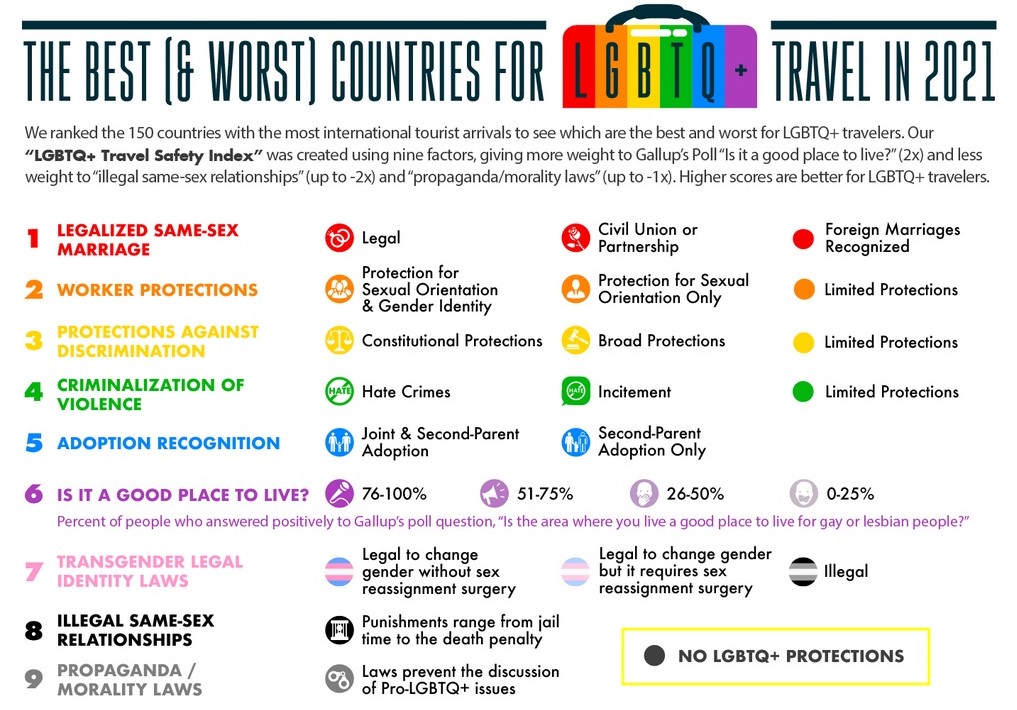
Source: Asherfergusson.com
According to the data collected by these criteria, the researchers gave Croatia an index of 188 points and a grade C+ from most safe to highest dangerous places (A to F), placing it among the first third of the best countries in the world in terms of LGBTQ+ safety.
In Croatia, the same sex-relationships are legal since 1977. However, same-sex marriage or families are not permitted, but same-sex life partnership is (i.e., civil union). The Life Partnership Act came into force back in 2014, and since then, hundreds of life partnerships have been concluded, with male life partnerships being slightly more common than female. Also, it is legal to change gender without sex reassignment surgery.
Violence against the members of the LGBTQ community is considered a hate crime in Croatia. Although this study says only sexual orientation is protected in Croatia, the truth is, both sexual orientation and gender identity are protected by numerous Croatian laws. The protections against discrimination are broad, although not constitutional. Croatian Constitution still does not include same-sex families, defining marriage only as "a life-long community of woman and man." However, one year ago, the Constitutional Court gave the right to same-sex couples in Croatia to be foster parents. Before, only single gay people could adopt children.
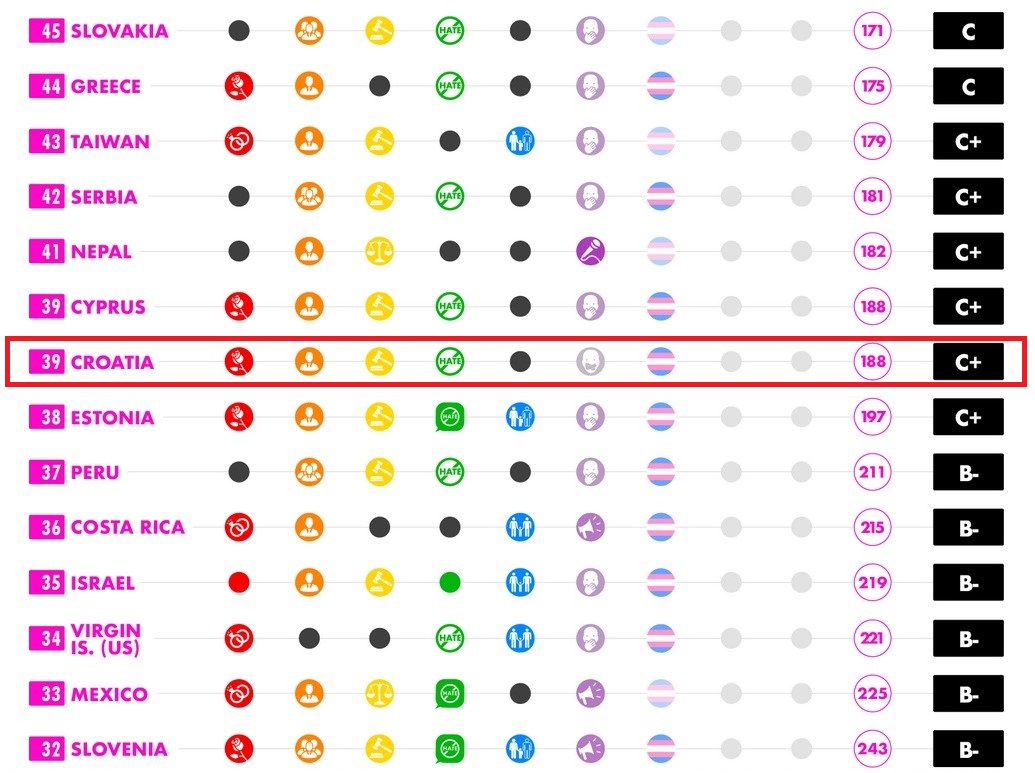
Source: Asherfergusson.com
The top ten safest countries for LGBTQ+ travel are Canada, the Netherlands, Sweden, Malta, Portugal, Belgium, the United Kingdom, Spain, Norway, and France. At the very end of the list, being the world's least safe countries for LGBTQ+ travel are Nigeria, Saudi Arabia, Malaysia, Malawi, Oman, Jamaica, Myanmar, Qatar, UAE, and Yemen.
Interestingly, the study shows that less than 25 percent of people said Croatia was a good place to live, according to Gallup's poll question's votes. These statements are arguable since one can experience life and circumstances in Croatia only by visiting it personally. Nonetheless, many places in Croatia have been gay-friendly for a long time, especially tourist destinations.
LGBTQ-friendly destinations in Croatia
Among Croatia's popular tourist destinations, Dubrovnik is considered the most LGBTQ-tolerant, while its neighboring island of Lokrum welcomes gays on nudist beaches. Of other popular Croatian coastal destinations, Split, Rovinj, Krk, Rab, Rijeka, and Hvar also welcome members of the LGBTQ community. Rab island has also become the first declared gay-friendly destination in Croatia.
Naturally, any larger town in Croatia that depends on tourism is accommodating, and gay and lesbian couples won't face discrimination. Some even go that far as to say that Croatia is one of the most tolerant countries in Europe for LGBTQ+ travelers. Meanwhile, people in smaller towns in rural parts of Croatia, due to their high traditional and religious values, tend to be very judgemental.
Last year, Croatia saw 66 new same-sex life partnerships, increasing for as many as 47 life partnerships than in 2019. Most of them were registered in Zagreb and Primorje-Gorski Kotar and Istria counties. The first gay marriage was even held in Slavonia, in Kutjevo, where such marriages are still not very well accepted among citizens, which gained a lot of interest there.
Bigger cities such as Zagreb find same-sex marriages and LGBTQ communities acceptable, as proven by the Zagreb Pride celebration of many years standing, even in pandemic-marked 2020. Still, a recent horrific hate crime perpetrated in Zagreb's Maksimir Park against a gay man, when two attackers threw a Molotov cocktail on him and caused him second-degree burns. Zagreb Pride association later condemned the attack, calling it the "worst anti-gay hate crime ever reported in Croatia." They and such associations, most of which are located in Zagreb, are trying to improve the position of LGBTQ people in the community, i.e., in Croatia.
Pride celebrations have also been organized in Croatian cities of Split and Osijek, while some other supporting celebrations occasionally happened in Rijeka and Pula as well. Also, Croatia's numerous music festivals and carnivals always welcome LGBTQ music lovers.
Although not all Croatians are tolerant, nor does Croatia have all legal protections for gay or lesbian persons, it seems like times are slowly changing for the better in creating a safe and tolerant environment for LGBTQ+ people.
For the latest travel info, bookmark our main travel info article, which is updated daily.
Read the Croatian Travel Update in your language - now available in 24 languages.
Horrific Hate Crime Reported in Zagreb Against a Gay Man
December 29, 2020 - Croatian media report today about a horrific hate crime perpetrated against a gay man in Zagreb's Maksimir Park last weekend.
Hajdi Karakaš-Jakubin reports the entire story for Jutarnji list: a 50-year-old man was taking a night walk in the Zagreb's biggest park, Maksimir, close to his home, this Saturday evening. Two unknown assailants first asked him if he had a cigarette lighter, and when he said he didn't, they started asking him various questions to find out what he was doing in the park. He started feeling uncomfortable, so he told them he was there to meet a friend (although he was just taking a walk in the evening!), and the assailants threw a Molotov cocktail on him and started running away. Soon his jacket caught on fire, and he was saved by brave passers-by, who ran to help him and contacted the emergency services.
He's currently hospitalised in the Trauma Clinic in Zagreb, with second-degree burns to his body, arms, neck, and face. Zagreb police department reported that they're determining all the relevant information about this case, but it will be very difficult to find those responsible, because they had surgical masks on, so the victim will probably not be able to identify them, even if some suspects are found.
Zagreb Pride association sent a strongly-worded letter to the Croatian media, condemning the attack. They say that they're terrified with the crime and that it's probably the worst anti-gay hate crime ever reported in Croatia. They demand a swift and decisive investigation into the crime, and that once the assailants are prosecuted, they are prosecuted for hate crime, and not a lesser crime. They also demand stronger protection for various minority groups (LGBTIQ community, Serbian, African, Romani minorities, as well as refugees and migrants) in the public spaces, which are often attacked by "right-wing gangs". They're offering their support to the victim, and are willing to provide legal and psychological help, if he wants that. They refuse the situation in which the victims of the homophobic violence get blamed for the crimes committed against them. Zagreb Pride stresses that each member of our society has the right to take a free walk in the public park for any reason whatsoever: to get some fresh air during the pandemic, to meet a friend or to set-up a date. They conclude their statement by adding that gay people are not to be blamed for anything just because they are who they are, while the right-wing gangs are to blame.
Croatia Gay Effigy Condemned: MP Files Criminal Charges Against Carnival
February 24, 2020 - MP Arsen Bauk SDP (Social Democratic Party) of Croatia has announced that he will file a criminal complaint against the organizers of the "Bakova povorka", which took place in the town of Imotski, at the local police station for burning an effigy of a gay couple. Zoran Milanović, President of Croatia, has demanded an apology from organizers and an appropriate response from the relevant legal institutions.
Numerous comments have appeared on social networks condemning the Imotski carnival (Bakova povorka), where an effigy of a same-sex couple holding a child was burned at the ceremony to widespread cheers. The child was presented in the form of SDP MP Nenad Stazić with a five-pointed star (Yugoslavia) on his forehead, according to Ana Roksandić/RTL Dnevnik on February 24, 2020.
Bauk to File Complaint Under Article 325 Croatia Criminal Code
Arsen Bauk has announced that he will file a criminal complaint against Milivoj Đuka, the organizer of the carnival parade, at the Imotski Police Station on Monday for the offense noted under Article 325 of the Criminal Code of Croatia.
There is a tradition of masks in Dalmatia, in which the people normally express their dissatisfaction with powerful political and social figures. However, the lynching of minority groups runs contrary to that tradition.
Croatia President Demands Appropriate Response for Shameful Event
Croatia President Zoran Milanović also responded to the "shameful event" on Monday morning.
"The symbolic burning of same-sex partners with a foster child in Imotski is a sad, inhumane and totally unacceptable act in the guise of the 'Bakova povorka' festivities. The organizers who staged this shameful event, in the name of tradition, deserve the strongest public condemnation because of the hatred they have demonstrated toward for others. Intolerance and inhumanity are not and will not be a Croatian tradition. I am seeking their public apology and the approptiate response reaction from the relevant institutions, especially as many children watched this event, thus witnessing the spread of hatred and inciting violence," he wrote on Facebook.
Former Croatia Prime Minister Jadranka Kosor reacted on Twitter:
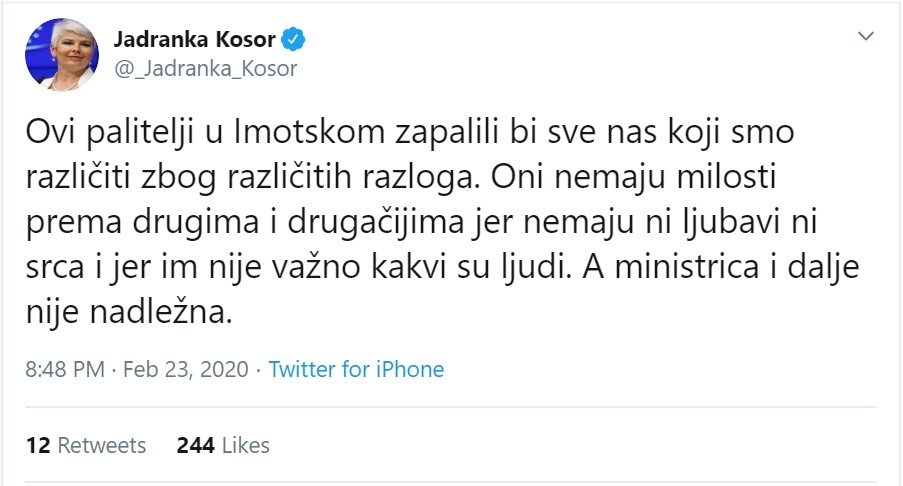
"These arsonists in Imotski would set fire to all of us who are different for various reasons. They have no mercy on others because they have neither love nor hearts and do not care what kind of people they are. And the minister is still incompetent," she wrote yesterday.
MP Bojan Glavašević also took to social networks to defend a same-sex couple, Ivo Šegota and Mladen Kožić, who want to adopt children.
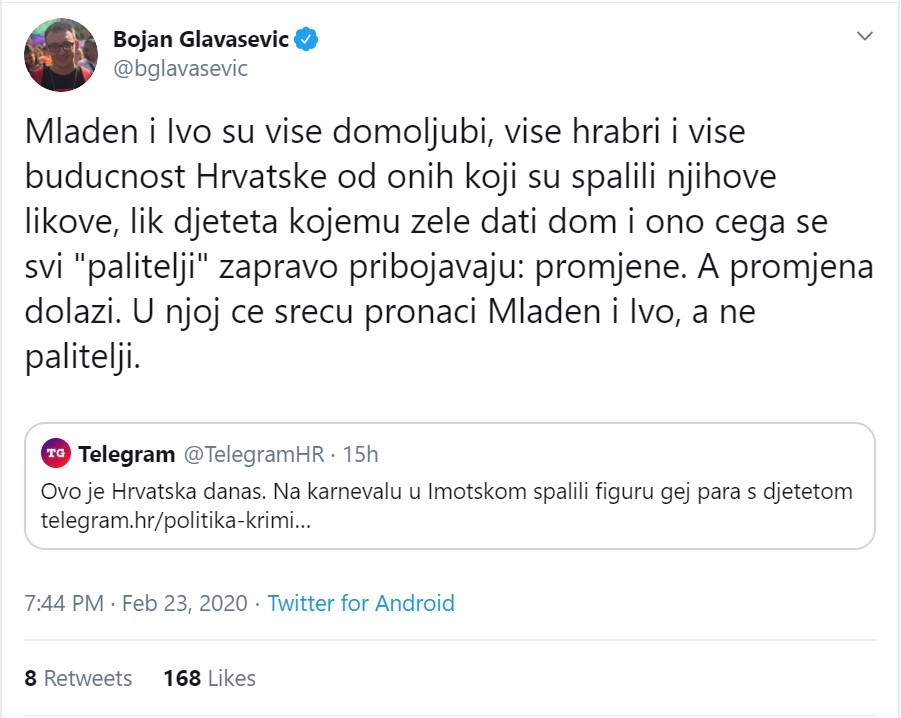
Croatia Gay Couple More Patriotic Than Imotski ‘Arsonists’
“Mladen and Ivo are more patriotic, more courageous, and more of a (positive) example for the future of Croatia than those who burned their characters, and the character of the child they wish to provide a home for. Change is what all these "arsonists" are truly afraid of. And change is coming. Within it, Mladen and Ivo will find happiness, not the arsonists,” he wrote in a Twitter post.
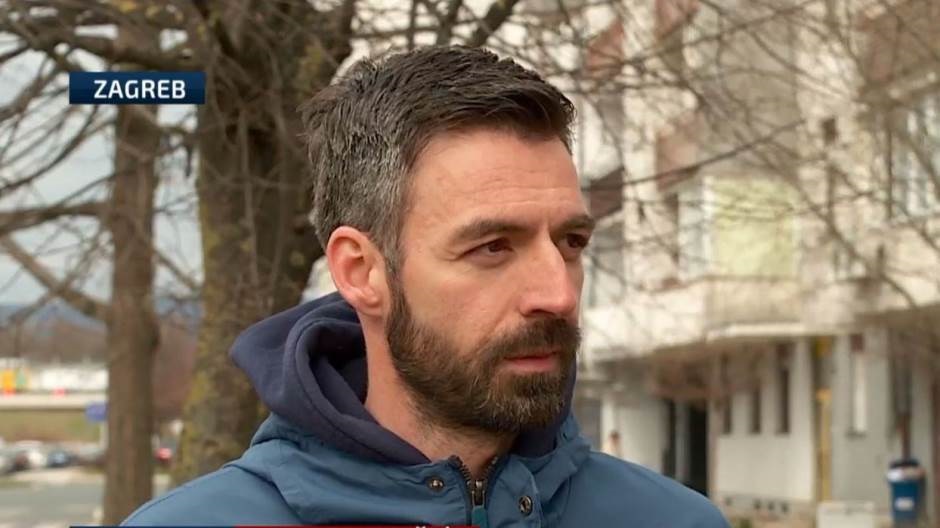
Kožić: 'I fear for all our friends who are already living with children in Croatia'
Mladen Kožić spoke to Hrvoje Krešić/N1 on Monday:
"This time I feel bad not only for myself, I am not afraid for either Ivo or myself, I fear for all our friends who are already living with children in Croatia," Kožić said.
"We know two fathers with a daughter in our first neighborhood and I feel bad for them because I cannot imagine how it must be for them now, and how they will explain to their children what exactly has happened," he added.
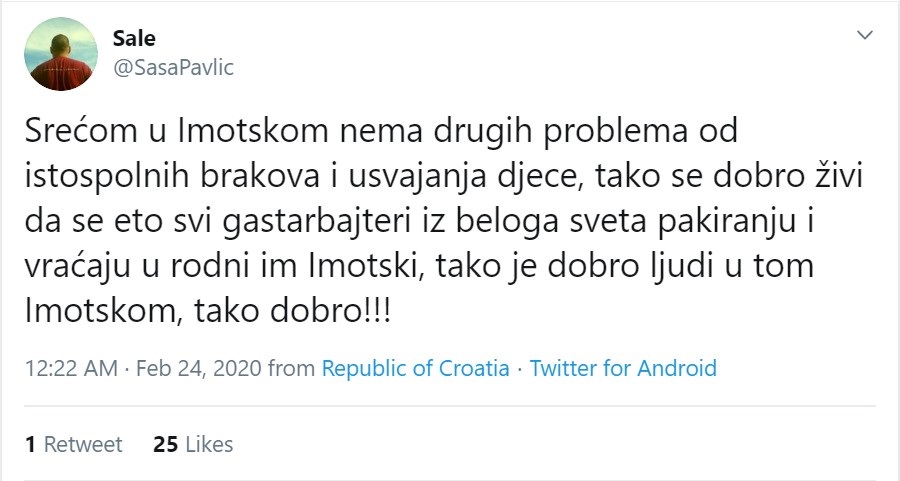
"Fortunately, there are no other problems in Imotski other than same-sex marriage and adoption of children, people are living so well there that all the gastarbeiters from this white world are packing and returning to their native Imotski, the people in Imotski have it so good, so good !!!", one Twitter user observed sarcastically. Milivoj Đuka, the parade's organizer, spoke to Dnevnik/HRT about the mass exodus from his hometown on June 21, 2015.
Interview with Đuka begins at 1:05.
Young Croatians Fleeing Imotski, Living Among Same Sex Couples Abroad
Thousands of young Croatians are fleeing to countries like Ireland, Sweden, Denmark, Germany and Austria where gay marriage and adoption are legal, and are living among openly gay and lesbian couples with children.
Another user emphasized that, according to carnival tradition, culprits should be burned for adverse behavior, not for adopting a child.
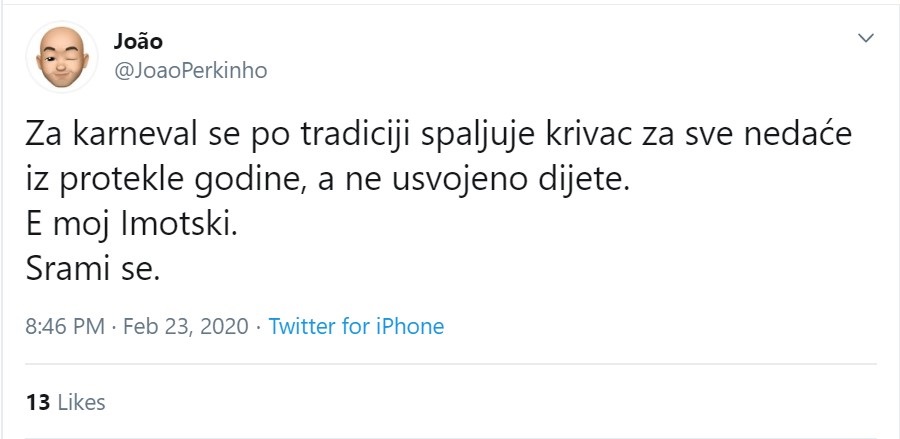
“According to tradition the carnival is traditionally an event to set fire to the culprit for all the troubles of the past year, not an adopted child.
My Imotski. Shame on you,” the user responded.
Act of hate speech?
Another user wondered if the gay couple effigy burning at the Imotski carnival was an act of hate speech.
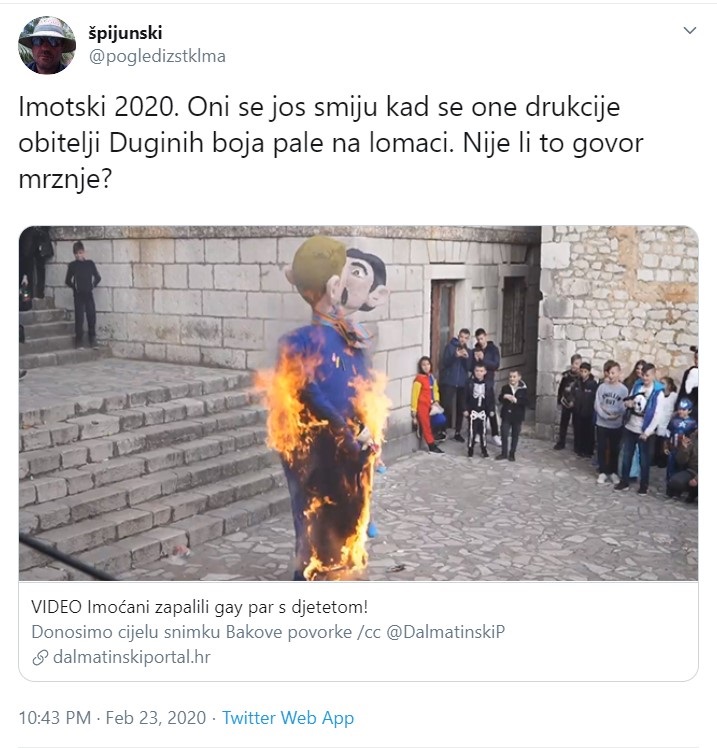
“Imotski 2020. They are still laughing when these alternative families of Rainbow colors fall into shambles. Isn't this hate speech?” the Twitter user asked.
The effigy of the gay couple is set on fire at 1:41:15 | Boško Ćosić Photography
See yesterday's Total Croatia News article about the effigy burning here. Follow our Politics page, Lifestyle page and this page for updates on this story and the state of LGBT rights in Croatia.
Croatia Town Burns Gay Couple Effigy at Parade: Imotski Residents Cheer
February 23, 2020 - Bakova povorka, the pinnacle of a 150-year tradition of carnival festivities in Imotski, Croatia was engulfed by scandal on Sunday afternoon when enthusiastic residents set fire to an effigy of a gay couple to widespread cheers.
Adopted Child Had Yugoslav Star on Forehead
Imotski residents chose to feature a gay couple with an adopted child, which had a five-pointed star on his forehead (resembling that of the Yugoslav flag) for the central carnival figure. They eventually set that effigy on fire and burned it to the ground to the cheers of onlookers.
“Like it or not, but this is abnormal for us, but everyone has the right to be whatever they want,” they proclaimed to onlookers.
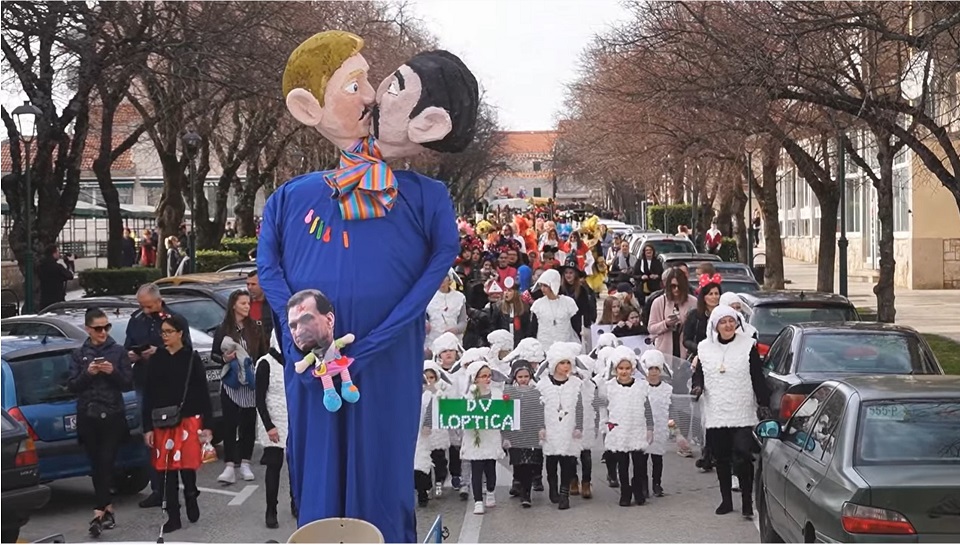
It’s also worth noting that the child doll, with the five-pointed star on his forehead and being held by the effigy of the gay couple, had the face of SDP (Social Democratic Party) MP Nenad Stazić. Earlier this year, it Stazić lent his support to same sex couples wishing to be foster parents. He also indicated that children were more at risk in the company of pedophile priests than under the care of openly gay foster parents. The effigy of the gay couple was followed by a group of children from the local kindergarten in the parade.
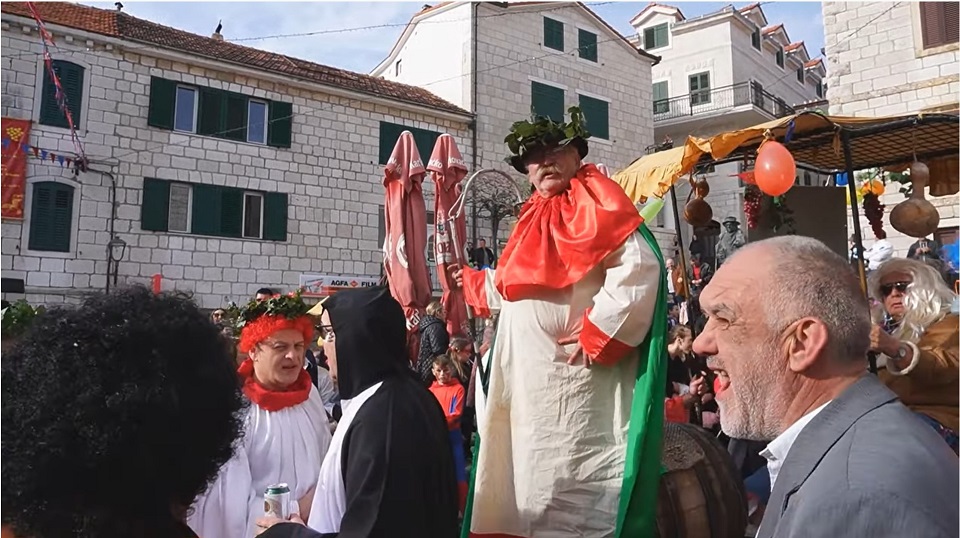
‘We are a conservative society’
"My head is spinning from this culture of death, and since my body is ailing, this year let’s set this grotesque family with baby Nenad Stazić on fire," the announcer proclaimed. Then, “Play the music" was heard as they ignited the effigy to wild cheers and applause.
When Slobodna Dalmacija asked Milivoj Đuka, president of the "Bako Ceremony Cultural Society" (KD Bakove svečanosti), for comment on February 23, 2020; he explained:
“We are a conservative society, and are sticking by tradition. Give a child to a mother, as the saying goes. We think this is the right thing to do,” Đuka claimed.
In an interview for Imotski Online on February 7, 2020; the festival's organizer had previously indicated that the main character of the parade would remain a secret.
"I can't reveal it to you. I can only say that everyone will understand who and what it is about," Đuka pointed out.
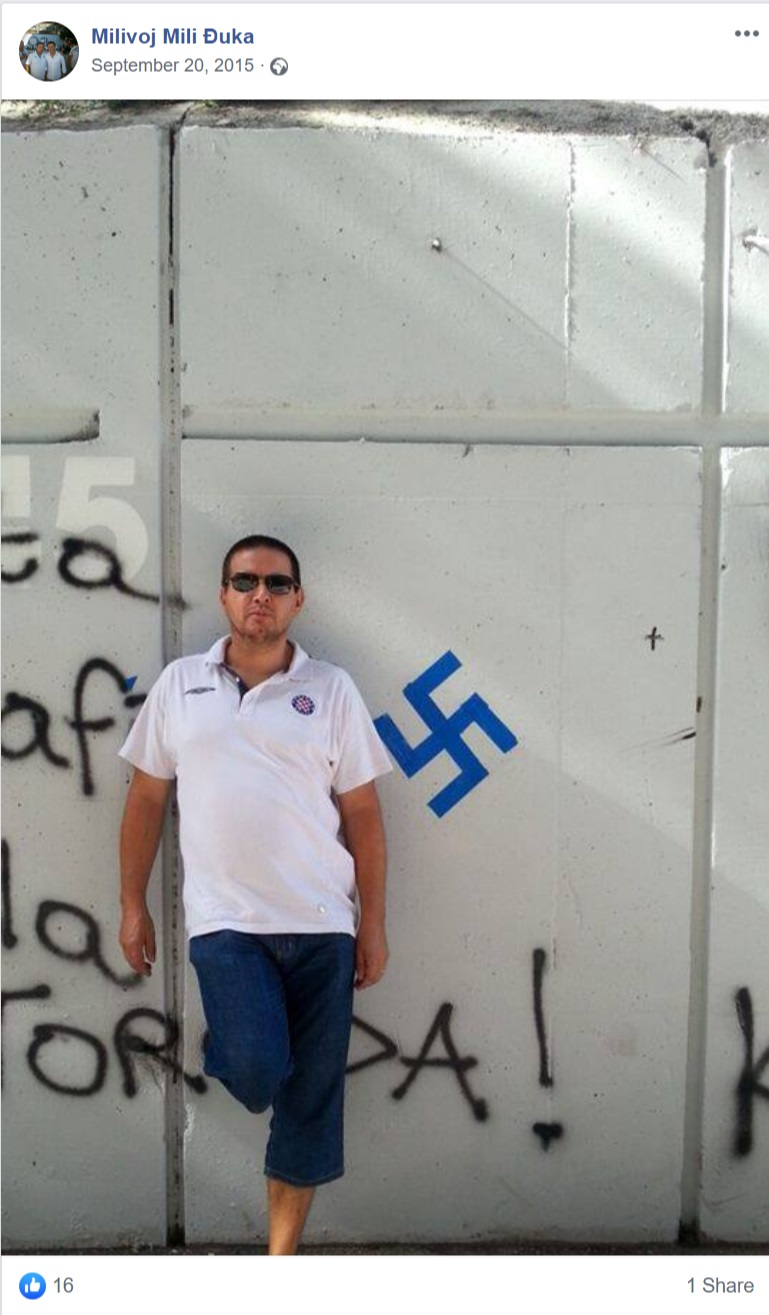
Milivoj Đuka | Facebook
According to a recent poll conducted by HRT (Croatia Radio Television); 63.7 percent of respondents are against allowing same-sex couples to be foster parents.
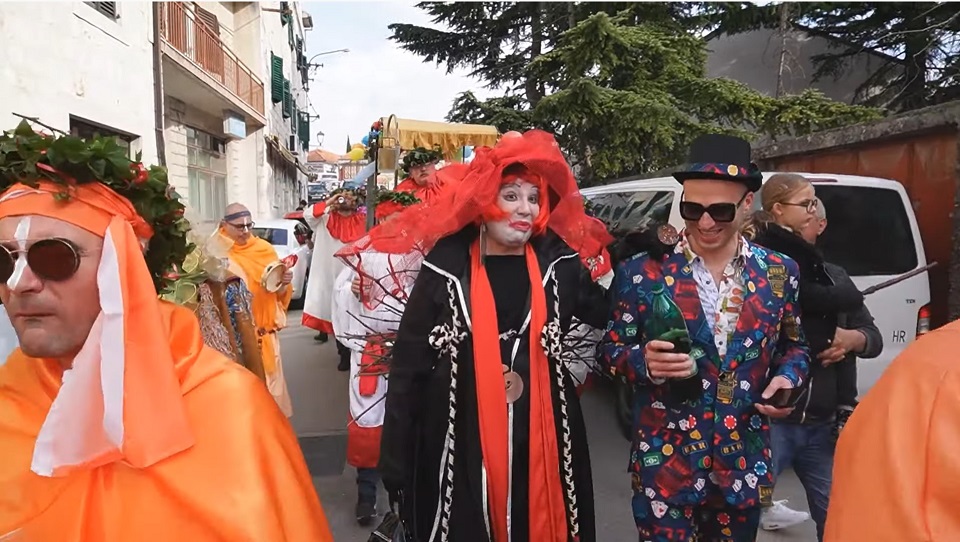
Croatia Parade Included Masks of Elvis Presley, Cleopatra, Josipa Lisac
Đuka made sure that there were as many masks as possible in the parade, all of which were made in homes throughout the town. Visitors also saw Nutcrackers, Cellists, Elvis Presley and his band, Flowers as well as individual masks of Cleopatra, and Pirates. In addition, there were homemade renderings of Croatia diva, Josipa Lisac, inspired by her performance at the inauguration of the new President.
The parade featured groups of children dressed like little lambs from the Kindergarten Ball, students from Imotski elementary schools, and many others.
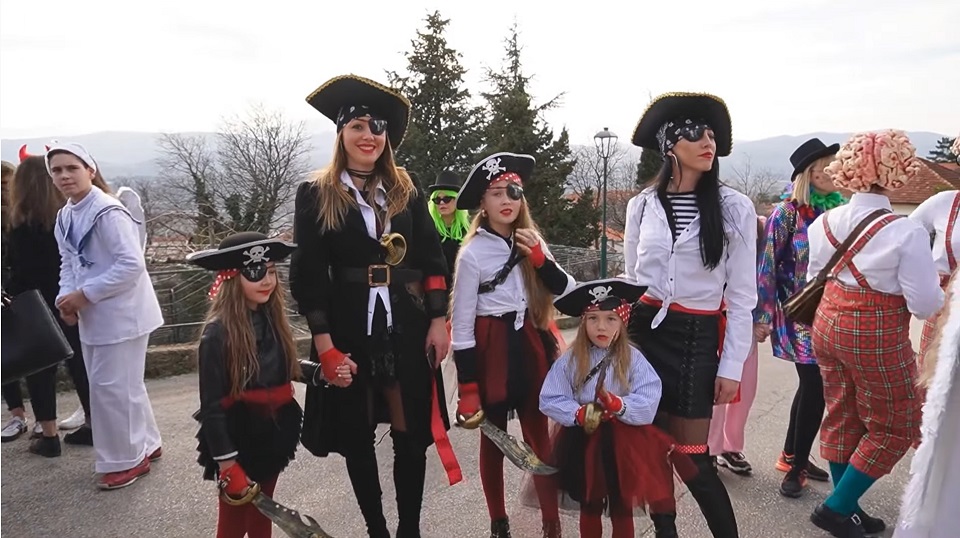
Members of the HPO Gradske glazbe Imotski (HPO Imotski Town Music Group), performed cheerful carnival songs for more than a thousand Imotski residents and their guests.
The effigy of the gay couple is set on fire at 1:41:15 | Boško Ćosić Photography
UPDATE February 24, 2020: Croatian leaders and citizens condemn effigy burning. MP Arsen Bauk files charges against event organizers.
Follow our Lifestyle page for updates on this developing story. More information on the "Bako Ceremony Cultural Society" (KD Bakove svečanosti) can be found on their website here and Facebook here.


